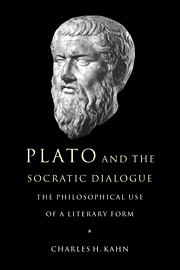Book contents
- Frontmatter
- Contents
- Preface
- List of abbreviations
- 1 Sōkratikoi logoi: the literary and intellectual background of Plato's work
- 2 The interpretation of Plato
- 3 Socrates
- 4 Plato as a minor Socratic: Ion and Hippias Minor
- 5 Gorgias: Plato's manifesto for philosophy
- 6 The priority of definition: from Laches to Meno
- 7 Charmides and the search for beneficial knowledge
- 8 Protagoras: virtue as knowledge
- 9 The object of love
- 10 The emergence of dialectic
- 11 The presentation of the Forms
- 12 Phaedrus and the limits of writing
- Appendix On Xenophon's use of Platonic texts
- Bibliography
- Indexes
2 - The interpretation of Plato
Published online by Cambridge University Press: 02 November 2009
- Frontmatter
- Contents
- Preface
- List of abbreviations
- 1 Sōkratikoi logoi: the literary and intellectual background of Plato's work
- 2 The interpretation of Plato
- 3 Socrates
- 4 Plato as a minor Socratic: Ion and Hippias Minor
- 5 Gorgias: Plato's manifesto for philosophy
- 6 The priority of definition: from Laches to Meno
- 7 Charmides and the search for beneficial knowledge
- 8 Protagoras: virtue as knowledge
- 9 The object of love
- 10 The emergence of dialectic
- 11 The presentation of the Forms
- 12 Phaedrus and the limits of writing
- Appendix On Xenophon's use of Platonic texts
- Bibliography
- Indexes
Summary
THE PROBLEM OF INTERPRETING THE DIALOGUES
An anecdote reports that, when Plato was about to submit a set of tragedies for competition at the Dionysian festival, he encountered Socrates on his way to the theater. After this conversation with Socrates, so the story goes, Plato returned home and burnt all his poetic compositions. If this story is not true, it is certainly ben trovato. Plato had the dramatic gifts of a Sophocles or Euripides, but he decided to exploit them in a different literary form. In the preceding chapter we surveyed the new genre that the development of Greek letters had provided for his use: the logos Sōkratikos, or “conversation with Socrates.” Since it was Socrates who had made Plato a philosopher, it was by writing about Socrates – more exactly, by representing Socrates in his writing – that Plato could legitimately deploy his dramatic powers in the service of philosophy.
Plato's compositions in the dramatic dialogue form achieved an immense literary success. But Plato's use of this form, in which he himself never appears, creates formidable difficulties for the interpretation of his thought. The anonymity of the dialogue form presents the interpreter with a problem that is unparalleled for any other philosopher. According to a Platonic doctrine suggested in many places and crystallized in the Republic, the philosophical vision tends to see things together, to seek for unity in the midst of diversity and plurality. But where is the unity to be found in Plato's own vision? Since we never hear Plato's own voice, how can we know where, and to what extent, what Socrates says represents what Plato thinks?
- Type
- Chapter
- Information
- Plato and the Socratic DialogueThe Philosophical Use of a Literary Form, pp. 36 - 70Publisher: Cambridge University PressPrint publication year: 1997



